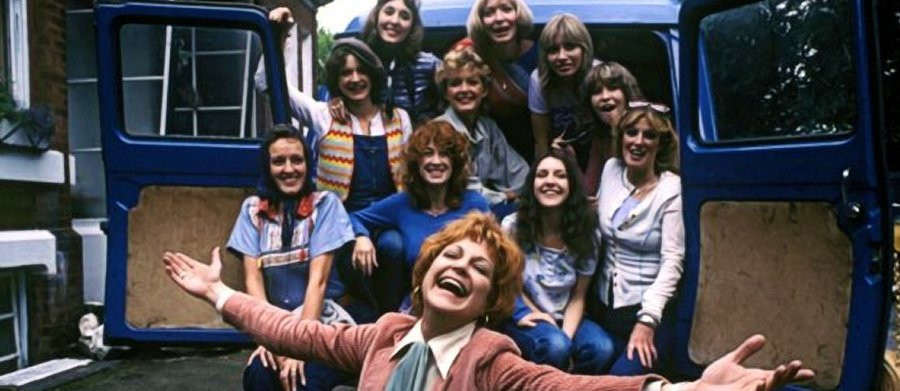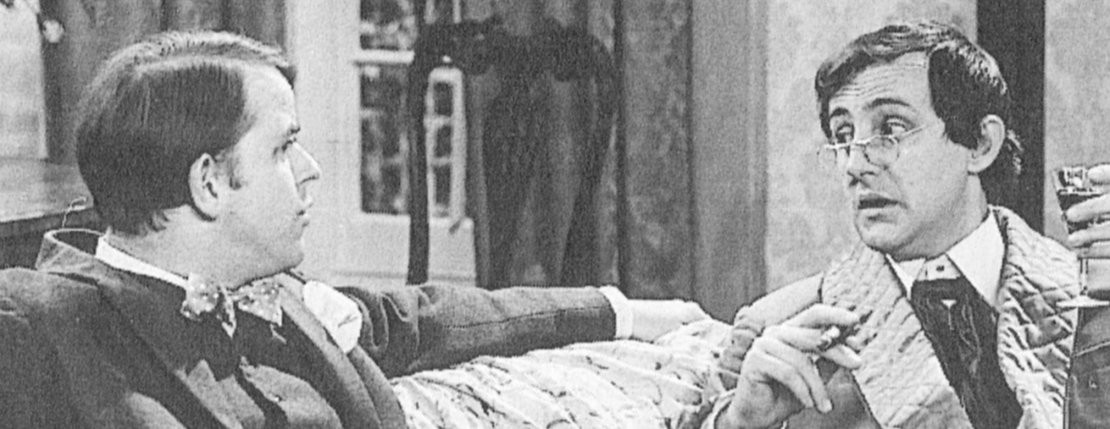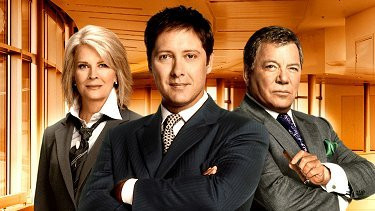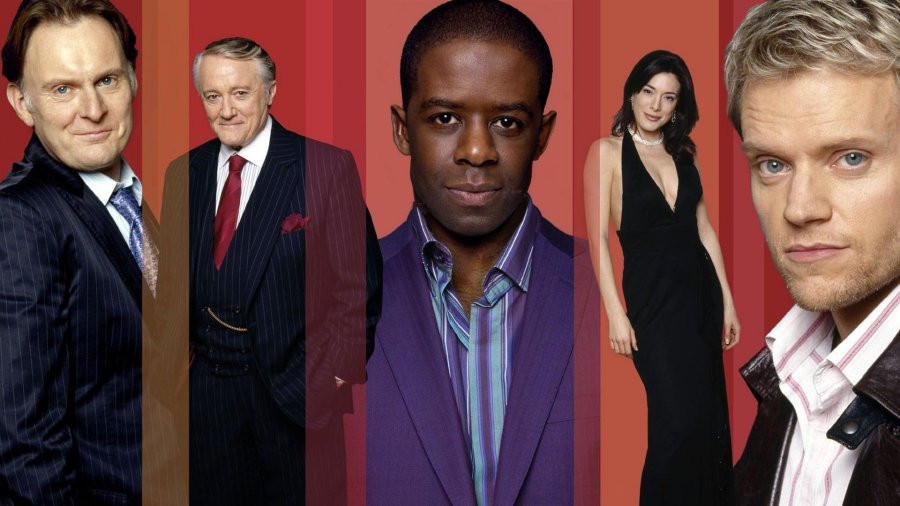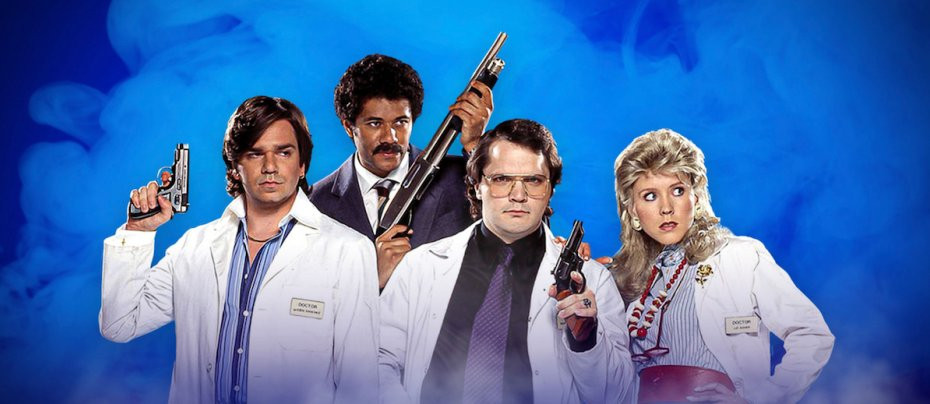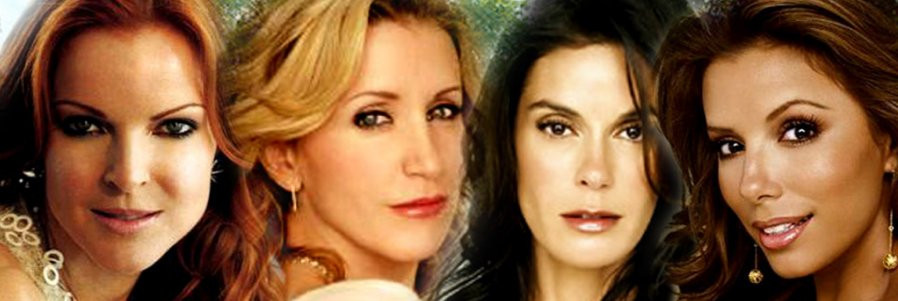
Desperate Housewives
2004 - United StatesWisteria Lane is a perfect upper-middle-class American suburb, with beautiful homes, neat lawns, minivans and sport-utility vehicles in the driveways, and an occasional baseball game in the street for the youngsters. But there are troubles beneath the surface.
Lynette Scavo is a former businesswoman who decided to get off the career track to raise four children. An attractive woman, Lynette is harried, anxious, frustrated at her three sons who misbehave at the drop of a hat, while getting little or no help from her always traveling husband (Doug Savant). Her neighbour Gabrielle Solis is a former model who married wealthy Carlos. He gives her all the possessions she desires, but not the physical relationship she craves. So while Carlos is out making his latest deal, Gabrielle turns to her buff teenage gardener John. John not only keeps Carlos’ beloved roses in full bloom, he pays particular attention to Gabrielle’s personal garden.
Book illustrator Susan Mayer is divorced with a bright teenage daughter. Getting back into the dating scene is the furthest thing from her mind-until she meets her new neighbour, the good looking plumber Mike. Unfortunately for Susan, she must compete for Mike’s affections with fellow Wisteria Lane resident Edie Britt, the town tramp with more Botox and silicone than most of Hollywood could ever dream of.
Then there's dedicated housewife Bree Van De Kamp. Played to the hilt by former Melrose Place vixen Marsha Cross, Bree is Martha Stewart in overdrive-too perfect when it comes to running her household, which drives her husband Rex to seek a divorce. At one point, Rex and Bree go to marriage counselling. Always prim and proper, Bree showed her true colours during a dinner party on the third episode, after Rex made the fatal mistake of telling his neighbours that he and Bree are having marital problems and visiting the doctor once a week. After the neighbours tried to lighten the situation by talking about their most embarrassing moments, Bree-with eerie calm and a knife poised to Rex’s back-blurted out to the other residents of Wisteria Lane that her hubby "cries" after the two have sex.
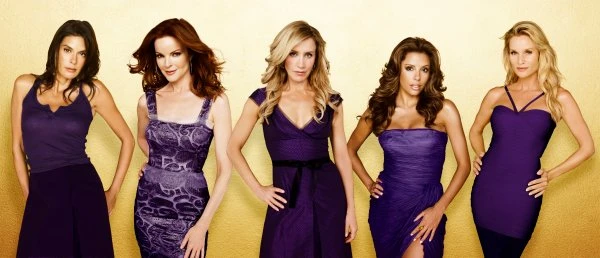
The sidebar stories of the women are nearly overshadowed in the pilot by the suicide of neighbour, Mary Alice Strong (narrated by actress Brenda Strong). What drives a perfectly rational and sane housewife to kill herself? And what’s the secret behind the note she left behind to the ignorance of her grieving son and seemingly uncaring husband? And what about Mike the plumber-Susan stumbled upon a gun in his kitchen cabinet and a map of Wisteria Lane. What secret is he hiding? Will Carlos learn about Gabrielle’s affair with gardener John, can Bree save her marriage, or will she stray? And what of Lynette? Will she be able to get her bratty boys in shape and find a new nanny, or will her dependence on prescription drugs get out of control?
There has long been a tradition on television of showing mothers as being there with a warm dinner, some good advice, and cleaner-than-clean, springtime fresh laundry. Even in these more enlightened times, the “good mom” (everyone from Marge Simpson to Debra Barone of Everybody Loves Raymond) has some character flaws but generally domesticated women are usually not shown as imperfect (except for the occasional Lifetime Channel movie). Maybe that’s why Desperate Housewives, ABC's hit comedy-drama, struck a chord with women who see themselves in the characters, while their clueless male partners think the show is all fantasy. The point their men may be missing is that they could be living with one of these women.
It was this thought that prompted show creator Marc Cherry to dream up Desperate Housewives. Cherry cut his teeth as a producer and writer on The Golden Girls. But in recent years, he became unemployed and was the victim of embezzlement from his long-time agent. One day, he and his mother was watching news coverage of a high-profile murder trial involving a woman named Andrea Yates, who was later found guilty of drowning her children in the bathtub. Cherry asked his mother if she thought anyone would be so desperate as to kill his or her children. She turned to him and admitted, "I’ve been there!". Cherry was shocked to discover that his own mother, who he always regarded as the perfect wife -because she had aspired to be nothing more, had had a series of 'mini-breakdowns' whilst bringing up three kids. Cherry realised that if his mother has these moments, every woman has had a moment when she's close to 'losing it.'
Cherry began fleshing out the idea and took the concept to executives at the various networks. The result: "At CBS," he says, "they felt it wasn’t (network chief) Les Moonves' taste; at NBC, there was another project in the works; at HBO it wasn’t gritty enough, and at Lifetime, I’m still not sure of the reason behind that." Cherry then took the script to ratings-laggard ABC, which was looking for something beyond more reality shows and CSI clones. ABC Network chief Lloyd Brawn and entertainment president Susan Lynne were responsible for getting Housewives on the air, but in April 2004, the network’s poor ratings (a distant fourth to CBS, NBC and Fox) led to their firing. Ironically, Brawn and Lynne actually saved the network. Besides “Housewives”, the pair were also responsible for developing Lost; Extreme Makeover: Home Edition and the US version Wife Swap, shows that made ABC competitive with the other major networks for the first time in years.
ABC executives feared with their weak schedule, they could not drum up enough publicity to get a large audience for the first episode. But the message got through. The pilot (which aired October 3rd, 2004) drew 21.3 million viewers-the highest number ever to watch a new ABC series since Spin City made its debut in 1996. It has also struck a chord in Britain; when the show made its UK debut on Channel 4 in 2005, it drew nearly 5 million viewers and about a quarter of the available audience-the best launch for an American series on C4 since the debut of ER in 1994. Social critics are having their say about Desperate Housewives as well.
Political columnist Ellen Goodman on stay-at-home mom Lynette: "She's saying, yes, you can want to be at home and still admit to going nuts at 5 p.m. Yes, you can be fiercely in love with your children and long to pack up the minivan and drive off. Yes, you can be dedicated to doing the right thing and not at all sure you're doing it."
The conservative American Family Association launched a letter-writing campaign to get three major advertisers to pull their spots from Desperate Housewives. But commerce won out. The show's popularity-joining CSI and American Idol in television's top five--led to other advertisers willing to buy time.
Another Housewives flap happened in late November 2004, when a promo featuring co-star Nicollette Sheridan in nothing but a towel seducing a real-life pro football player during ABC's Monday Night Football broadcast. It reignited the on-going debate over broadcast content in America, even though the promo showed less nudity than a typical hospital scene on ER or a criminal investigation on Law & Order or CSI.
Creator Mark Cherry is feeling the heat as well, noting "there was this scathing reviewer who thought I was writing these 1961 portraits of women. Calling them housewives. How dare I? And the fact that a lot of their personal unhappiness revolved around men in their lives. I thought, have you met any women? A lot of the women I know, that's what they're complaining about -- either the man in their life or the lack of a man in their life."
In some respects, Desperate Housewives is the follow-up to the now departed Sex And The City. While Carrie and her New York friends could dish about men, sex, men and sex, they were still trying to find their places in the world. The women of Housewives are different. Each has made choices; each is facing the fallout from those decisions.
And it should be noted the Housewives women are not young things. They're older, still darn good looking females with healthy sexual desires-a far cry from the confusing virgin/vamp persona of younger personalities such as Britney Spears. Middle age has never looked so attractive.
Seen this show? How do you rate it?
Seen this show? How do you rate it?
Published on December 7th, 2018. Review: Mike Spadoni (January 2004).


